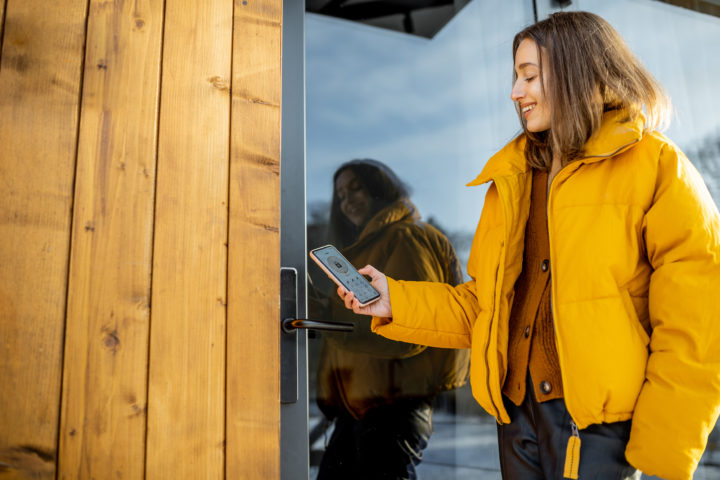The following contribution is from another author.
In this day and age, having a simple key to protect and keep your home safe may not be your best option, especially if you want to take your home security to the next level. If that’s the case, having a smart lock may be the right one for you.
Smart locks allow you to have access and take control of the security of your home even when you’re not at home. They’re an essential addition for converting your home into a smart home, with which you can access everything using digital devices, such as mobile devices.
In addition, smart locks don’t have a physical key. All you need to do is register a password code you will use every time you enter a locked home. Some may also include facial recognition and identification systems for more powerful home security protection.
Are you planning to have a home security system? Ojmar has smart locks built with excellent features that can ensure the safety of your home and your family. You may also visit your local hardware stores to consider other options available in the market.
But before buying one, here’s a compact guide containing everything you need to know about smart locks.
What Are The Different Types Of Smart Locks?
Smart locks come in different types, depending on your needs. When choosing among these types, consider which can offer the protection your family needs. And for that, here are some types of smart locks you might want to know about:
Biometric Smart Locks
Biometric smart locks work using fingerprints as the primary key to lock or unlock the door. You can program these by installing different fingerprints, granting everyone access to your home without any keys. Also, you can use multiple fingerprints in case one gets injured or wounded.
Smartphone-Aided Smart Locks
These are smart locks that you can access using smartphones and other smart devices with the help of an internet connection. They allow you to lock and unlock your doors even when you’re not home. It can also give you details on when your door was accessed and who accessed it.
Card-Supported Smart Locks
These smart locks have cards similar to bank cards you can use as a key to unlock your doors. You can swipe or tap them on the designated area to open the locked door. You can also find them in many high-quality hotels.
Passcode Smart Locks
These are electronic locks you can open using a random set of numbers. If you want to use this type, ensure you change your passcode regularly for maximum protection. And don’t use any combination related to you, such as your birthday or phone digits.
Facial Recognition Smart Locks
These are among the most expensive and most powerful types of smart locks. Instead of using pin codes, fingerprints, and others, these locks open by face scanning. All you need to do is stand in front of the built-in camera and let it scan your face. Once recognized by the system, the door will open.
What Are The Communication Protocols For Smart Locks?
Smart locks have three standard operating protocols, which you need to know and understand before making a purchase. It includes:
Wi-Fi Protocol
Wi-Fi is probably the strongest communication protocol system that can transmit data continuously, even with weak internet connectivity. It allows you to operate your electronic locks even at work.
However, Wi-Fi-assisted smart locks require a vast and consistent power supply. You will also need to change their batteries frequently to keep them operating at full power.
Z-Wave Protocol
Z-wave protocols function similarly to Wi-Fi. However, they utilize less energy compared to the latter, which means you won’t be changing their batteries too often. It’s a wireless communication mainly for security systems. However, they won’t be able to connect using the internet to transmit data. Instead, they require a Z-wave hub to support it.
Bluetooth Protocol
Bluetooth may not be as powerful as a Wi-Fi-assisted system, but it has enough functions to operate an electronic lock. However, it has a limited range of around 150 feet since it doesn’t use an internet connection to function. Despite that, it’s good value for money and requires minimum maintenance.
On top of that, Bluetooth is found to be safer than Wi-Fi. It can’t be traced by tapping illegally on your internet connection. Therefore, it can’t be hacked.
Furthermore, it has a long battery life due to its simple operating features that don’t require a consistent power supply.
What Are The Disadvantages Of Using Smart Locks?
Smart locks may not be the perfect solution to your problems, but they can offer additional home security that a basic lock and key can’t provide. With that said, here are some possible disadvantages of using this locking system:
Technology May Fail
Like other smart devices, smart locks may also fail eventually. More so if they’re used excessively or physically damaged. Also, the technology may not address your request accurately. For example, all doors start to open, even if you’re only trying to unlock a single entryway, especially if all locks are connected using the internet.
Vulnerability to Hacking
Since most electronic locks use internet connectivity to access and operate, they may get hacked by someone interested in your house. Once they do, they’ll be able to open your doors without you even knowing. Therefore, it’s crucial to keep your connection secured and change your passwords regularly.
Fortunately, most electronic locks have an alert system for unauthorized access. If the system detects that the entry didn’t come from you, they’ll immediately signal the authorities for possible illegal intrusion.
Power Dependence
Smart locks need a consistent power supply to operate continuously. There may be instances where you need to change batteries frequently, which can be costly. Also, you have to change their batteries before they lose their supply of energy. Otherwise, you may have a hard time getting into your home. You can check the battery supply using your smartphone. That’s if your smart lock can be connected to mobile devices.
Final Words
Smart locks are excellent tools that offer additional layers of protection for your home and your family that a basic lock and key can’t provide. However, it’s also worth noting the risks of using them, such as technological failures, hacking, and power dependence.
Other than that, smart locks are still more efficient than the plain old keys that you can lose at any time. Also, it often comes with a security alert that notifies its owners and authorities about unauthorized access. It is up to you to get a suitable lock you and your family need.

















Good Article, Good explanation for Smart Locks, I Like this Content
I think the same devices are also available now – https://shop.ezlo.com/collections/door-locks/